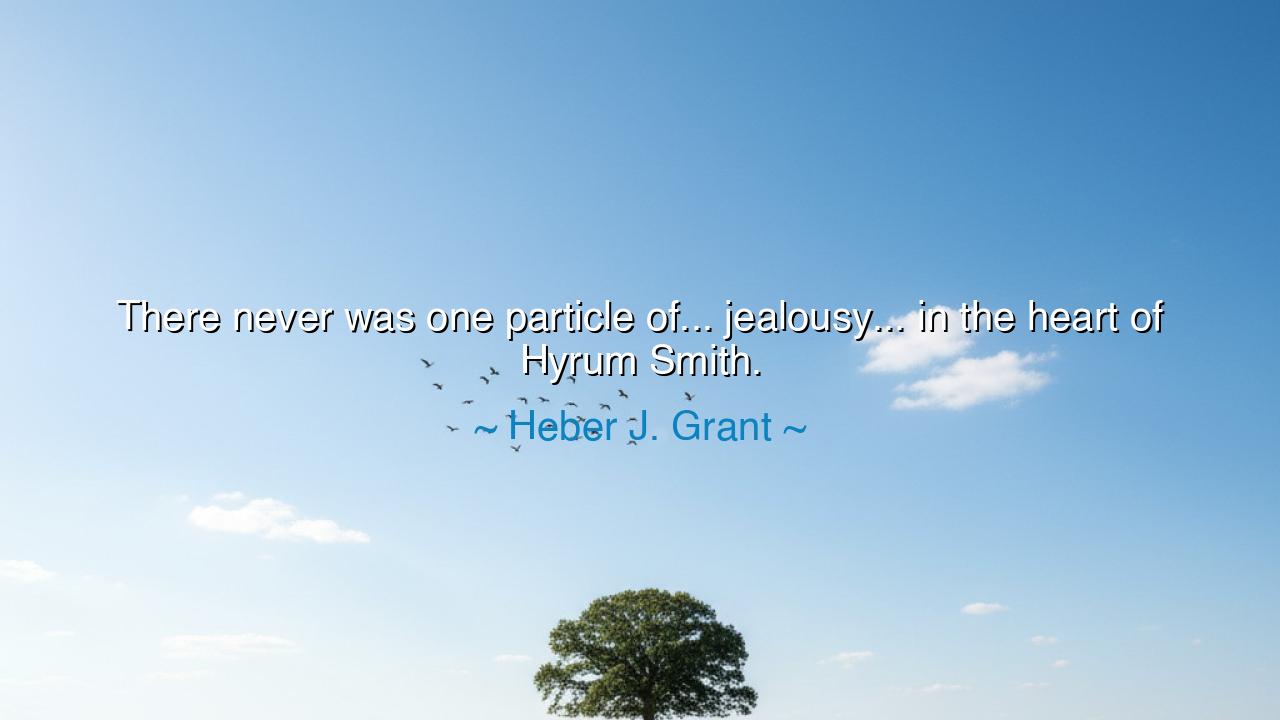
There never was one particle of... jealousy... in the heart of






Heber J. Grant, a leader of faith and endurance, once declared of a noble friend and martyr: “There never was one particle of… jealousy… in the heart of Hyrum Smith.” These words, spoken in reverence, do not merely describe a man—they reveal an ideal. For to be free of jealousy is to be free of one of humanity’s oldest chains, the chain that has bound brothers against brothers, nations against nations, and lovers against lovers. To say that Hyrum Smith bore not even a particle of this poison is to say that his heart was pure, that his soul was steadfast, and that he lived with a greatness beyond the ordinary measure of men.
The meaning of this tribute is profound. Jealousy springs from fear: fear of being less, fear of being forgotten, fear of being overshadowed. But a heart untainted by jealousy is a heart anchored in trust, generosity, and love. Hyrum Smith, brother of Joseph Smith, stood not as a rival but as a companion, never seeking to outshine, never hungering for glory. In an age when leadership often stirs envy, his freedom from jealousy became a beacon of loyalty. He proved that greatness lies not in conquering others, but in uplifting them without resentment.
The ancients, too, recognized the danger of jealousy. Cain’s envy of Abel’s offering led to the first murder recorded in scripture. The Greeks told of Hera, who, consumed by jealous wrath, unleashed storms upon innocents. And in Rome, envy among senators destroyed trust and gave rise to daggers against Caesar. Against this backdrop of human frailty, Hyrum Smith’s example shines brighter still: a man who resisted this universal temptation and remained whole. Heber J. Grant saw in him a soul who lived without rivalry, a rare jewel in the crown of humanity.
History gives us other rare examples. Consider Jonathan, the son of King Saul, who befriended David though David’s rising star threatened his father’s throne. Jonathan could have resented the prophecy that David, not he, would rule Israel. Yet, like Hyrum Smith, Jonathan cast aside envy and instead strengthened David with loyalty and love. He showed that bonds of brotherhood are far stronger than the corrosive acid of jealousy. Such men stand as eternal witnesses that it is possible to live without envy, and that such a life brings both peace and honor.
The lesson is stirring: to live without jealousy is to live with courage. It demands that we trust the worth of our own soul, that we measure ourselves not against others, but against truth. Hyrum Smith was not lessened by his lack of envy; he was magnified. Freed from rivalry, he could serve wholly, love fully, and die honorably. His life teaches us that jealousy is not an inevitable fate, but a choice—a chain we may refuse to wear.
Practical wisdom flows from this teaching. When jealousy rises within you, pause and examine its root. Is it fear? Is it pride? Replace it with gratitude for the gifts of others and trust in your own. Practice celebrating the victories of those around you as if they were your own, for their light does not diminish yours, but adds to the brightness of the world. In your family, in your work, in your friendships, choose loyalty over rivalry, encouragement over envy.
So let this teaching be remembered: there never was one particle of jealousy in the heart of Hyrum Smith—and in that, he showed us what true greatness is. To live without envy is to live with freedom, to serve without fear, to love without condition. Follow his example, and your own heart will grow strong, your relationships will flourish, and your life will shine with the quiet power of one who is secure, steadfast, and pure of spirit.






AAdministratorAdministrator
Welcome, honored guests. Please leave a comment, we will respond soon